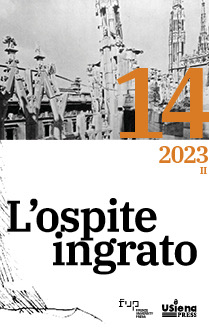Un’introduzione al concetto di apocalisse dialogica. Frantumi, cocci, relitti e scorie degli scambi di battute nella poesia italiana del Novecento
Published 2023-12-22
Keywords
- dialogue,
- Conversation Analysis,
- direct interactions,
- Dialogical Self Theory,
- twentieth-century Italian poetry
How to Cite
Copyright (c) 2023 Giulia Martini

This work is licensed under a Creative Commons Attribution 4.0 International License.
Abstract
The expression «dialogical apocalypse» defines the modalities of dysfunctional communication in twentieth-century Italian poetry, where dialogue does not manifest itself as adherence to mutual communication, but refers to the malfunctioning of communication itself. In lyrical texts, verbal interactions are constantly inserted in a complex network of communication pathologies and dysfunctions. The anti-dialogical function acts on multiple levels: structural (for example, by skipping a turn), pragmatical (as the answers that do not respond), thematic (in particular, the tendency to return to intractable topics, such as death), and relational (the exchange is constituted in conflict and antagonism). The present article aims to frame the anti-dialogical function by proposing a metaphorical juxtaposition between the dialogic process and the Fifteen puzzle, through the comparison between some textual samples (from Gozzano, Caproni, Sereni and Sanguineti) and the main modules of pragmatic incongruity.

